All about grafting secateurs
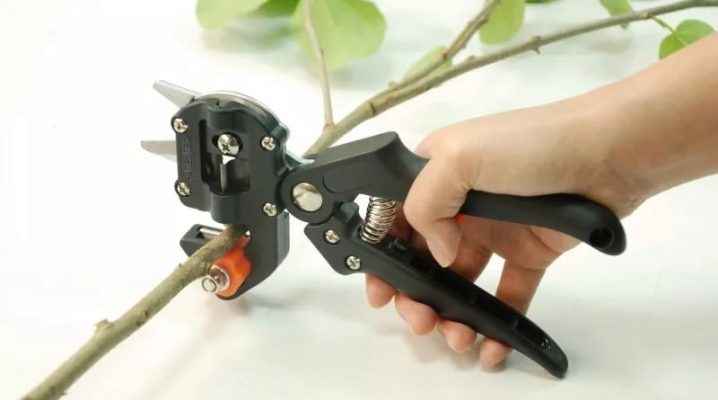
Many domestic gardeners do not limit themselves to growing the usual fruit and berry crops and try to experiment. To do this, they have to graft their plants and in this the grafting pruner is of great help. The device is much more effective than a garden knife, and there is nothing difficult to use - even a beginner can cope with the work.
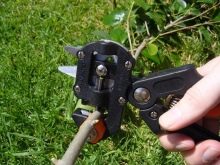
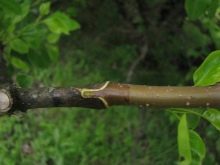
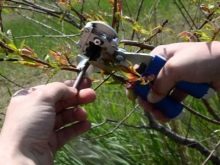
Peculiarities
The grafting pruner consists of a working blade, a spring, a stopper and a comfortable handle. Some models are additionally equipped with a standard knife for pruning young cuttings. Such products are similar to pruning shears for garter grapes, but the main difference between such a cutting blade is its configuration - it is bent so that you can get a figured cut.
Depending on the type of this cut, knives of several types of replaceable blades are distinguished:
- V-shaped.
- U-shaped.
- Ω-shaped.
Each shape is used to work with specific types of trees.
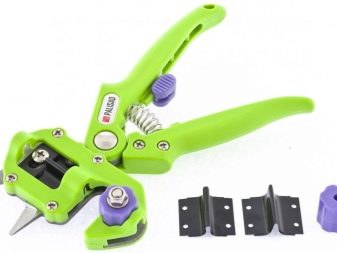
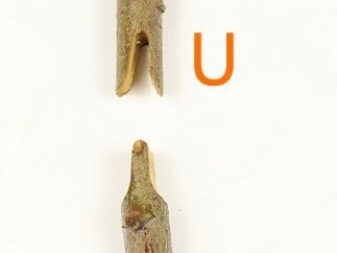
It is no secret that the success of grafting is largely due to the accuracy of the coincidence of the sections on the rootstock and the scion, which is why the design of the cutting part of the secateurs is made in such a way that the sections coincide without any further adjustments. Secateurs are professional, can be equipped with a power drive, contact or lever mechanism. Regardless of the type, the blades are made from high-carbon hardened steel, as a rule, they are well sharpened. The vaccine sectors have many advantages, among them the following can be distinguished:
- the grafting process lasts only a few minutes, so a significant number of plants can be processed in one day;
- thanks to the pruner, not only young annual shoots can be grafted, but also older and, accordingly, thick;
- secateurs are made from the most modern materials, so the tool does not lose its performance for several years.
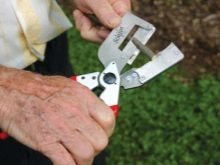
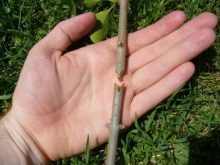
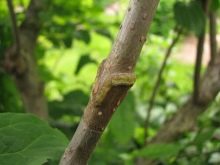
Keep in mind that using such a tool, you can process different trees, but the shoots must always be of the same width. So, the permissible deviation should not exceed two millimeters, otherwise it is better to use a grafting knife.
And also pay attention to the fact that such a device is suitable for grafting branches of 4–12 mm. If the shoots are thinner or, conversely, wider, then it is better to use other devices, since the pruners have their own technical limitations.
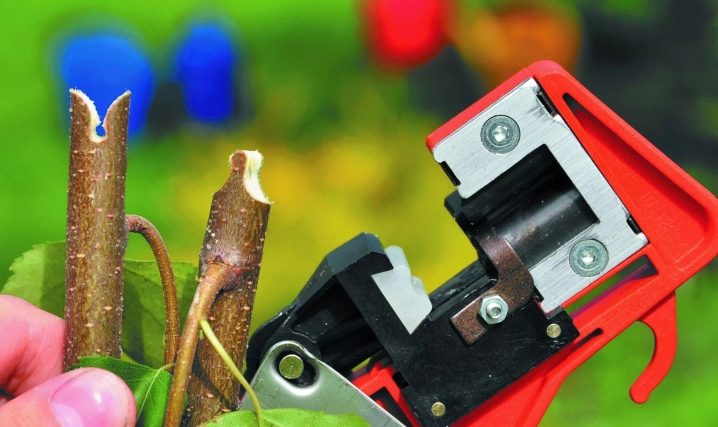
Users also note some of the disadvantages of secateurs.
- Of the three types of knives included in the kit, the most effective is the omega-shaped (Ω), since it forms a lock connection between the stock and the scion, so grafting can be done with both hands. However, this knife is not suitable for thin shoots. But the V-shaped device often gives an insufficiently strong connection, so the scion does not hold tightly enough, it has to be wrapped with one hand and this can be quite inconvenient to do.
- Pruners cut the wood across the grain, so the knives quickly become blunt, which leads to the fact that the edges of the cuts are crushed, and the fibers are soaked, so most models simply do not withstand the vaccinations declared by the manufacturer in number of 1,000 or more.
The grafting shear knives have a rather complex shape. Therefore, in order to sharpen them, specialized tools are needed.
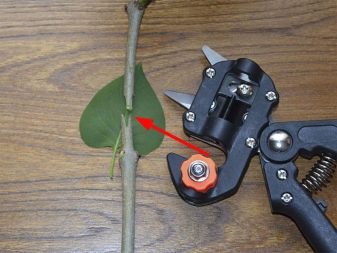
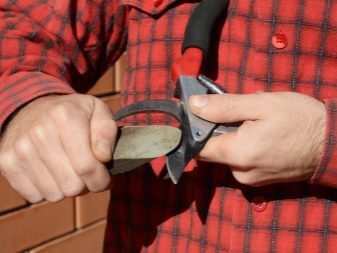
- Replacing knives is not an easy procedure, it requires some effort and time - it is carried out using two screwdrivers of different sizes, and also using pliers and keys. But not every garden plot has such a set of tools. That is why professionals advise to purchase two secateurs so that if one fails, you can continue to work with the second, and then carry out all the manipulations necessary to replace the blade.
- With the help of the pruner, the cut comes out shortened - no more than 1 cm, therefore, there are many breaks in the grafting area, therefore, in this the tool is significantly inferior to simple grafting knives, since the latter allow you to make a cut of up to 4-5 cm. Many gardeners after a while note that at the site of inoculation, performed using a pruner, a characteristic growth appears. When using a knife, nothing like this happens, the boundaries of the fusion are almost invisible to the prying eye.
- Vaccination work carried out with the help of a pruner is rather limited in time - as a rule, from the very end of April to May 10. They can not do the pruning, therefore, the purchase of a pruner should not exclude the purchase of a knife, rather, supplement it.
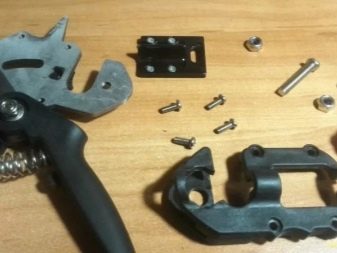
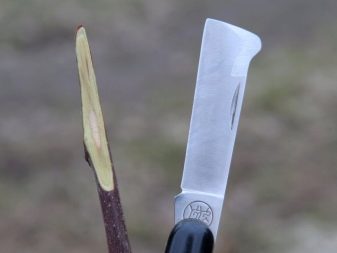
Appointment
A grafting pruner is needed for grafting roses, apple trees, plums, pears, grapes, cherries and many other flower, fruit and berry crops in autumn and spring. Grafting is considered one of the most popular agricultural techniques, thanks to which you can achieve good fruiting even in the area, the conditions of which are unacceptable for the fruits and berries of a particular crop.
With the help of a garden grafting device, as statistics show, vaccinations are 90-100% successful, and a tool from a reliable manufacturer can withstand up to 3 thousand cuts.
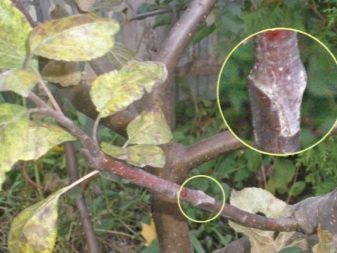
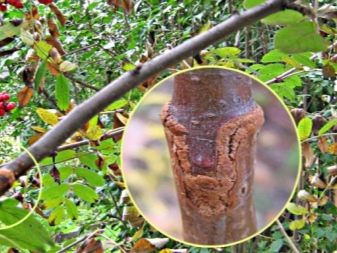
Rating of the best models
A garden pruner turns a complex activity into a fairly simple procedure that even a novice gardener can easily handle. However, only if the tool is of excellent quality and reliability. The cost of products that meet all the basic requirements starts at 1,500 rubles. In stores, you can always find a wide selection of both little-known Chinese and Belarusian products, as well as products of well-known brands.
The most popular model, according to consumer reviews, is the tool Professional Grafting Tool... This is one of the best tools that can be implemented in any configuration - with one knife, two or even three.
The manufacturer also produces a gift version in a case, which includes a screwdriver for changing blades.
The reason for such a demand for the model lies in its highest quality. The blades are made of robust chrome-plated steel, making the tool resistant to rust and corrosion. The handles are comfortable, plastic, some models are equipped with rubber pads that prevent the instrument from sliding in the hands.
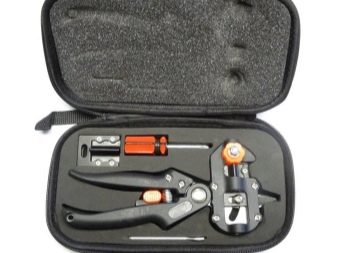
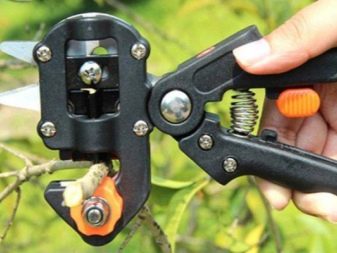
Artitec 3T - This is another popular modification, which is equipped with a special blade that allows budding, that is, inoculation with a kidney. Here, as in the previous model, the knives are made of high-carbon steel, the blades are forged and sharpened. This pruner is made in Italy, so the price tag for it is quite high.
The same Italian company offers secateurs Artitec complementary gtafter - they are optimal for cuttings less than 4.5 mm in thickness. This tool can only be used to cut the rootstock when grafting into the split. In this case, scion cuts are made with completely different pruners.
The most popular models also include Due Buoi 300/21, Finland 1455, Italy, ArtiTec Manual Grafting 3T AR-INN3T, Alvaro Bernardoni, Skrab, and Zubr made in Russia.
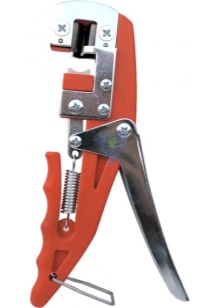
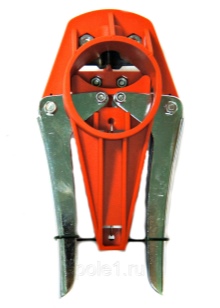
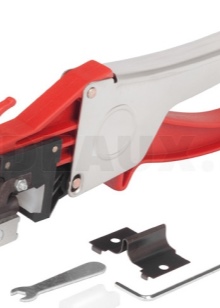
Subtleties of choice
In order for the vaccination to quickly take root and be successful, it is necessary to choose the right instrument. To do this, several factors must be taken into account.
- The sharpness of the blade. Pruning shears should always be well sharpened. Most manufacturers produce knives made of alloy steel or coated with Teflon - such options are quite durable and serve their owners for more than one year.
- Reliability of fastening. Back in the store, check how tight the blade is in the handle. If the fasteners are not of high quality, then during operation there is a high probability that the knife will slip out and become a source of injury.
- Spring type. The spring connects the handles and therefore, as the user reviews show, it is better to give preference to the belt mechanism, the springs of which are more reliable, durable and do not require much physical effort.
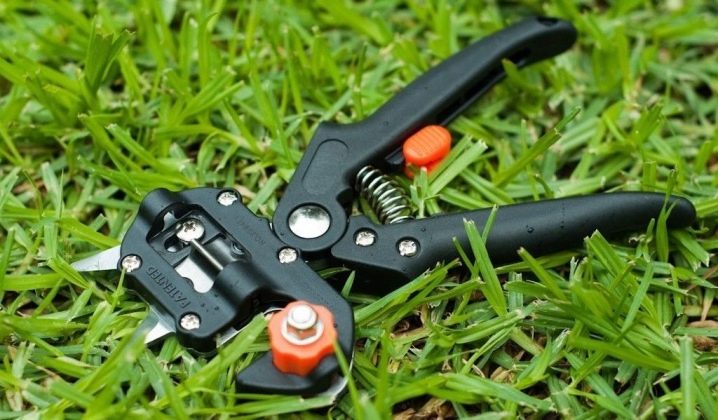
- Knife stroke. The blades should go quite tight so that the gap between them remains minimal. If these requirements are not met, then in the process of work the shoots will be crumpled and deformed.
- Convenience of the handle. When choosing a pruner model, it is better to choose a rubberized handle, in this case, you can be sure that even after prolonged work, calluses will not appear on the palms. And if there is a recess for a finger in the lower handle, then you will hardly regret buying such a model.
- Knife thickness. The optimal parameter for the blade thickness is 1.5-2 mm. As a rule, in reliable retail outlets, they allow you to cut and offer ordinary paper for this.
The cut must be even, and if the knives begin to tear the sheet, you should look for the product elsewhere.
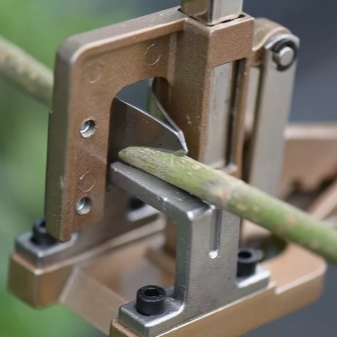
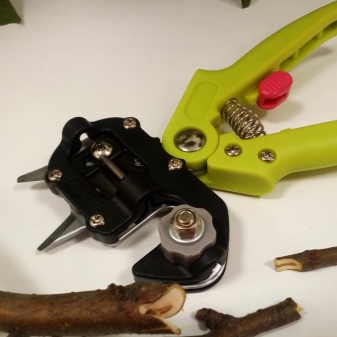
How to use it correctly?
A pruner, like any other garden tool, needs to be well looked after, otherwise it will not last long and after a few dozen inoculations you will have to update it.
The instructions are simple.
- The basic rule of care is this: after each use, the pruner should be cleaned of dust, dirt and adhered plant sap, then wiped dry and, if necessary, lubricated with oil.
- The tool should be stored in a dry place, it is not recommended to wash it with water, in this case the spring mechanism may well rust, although this drawback applies only to cheap modifications. It is allowed to rinse branded secateurs with cool water, but immediately after that they should be wiped dry with a soft cloth.
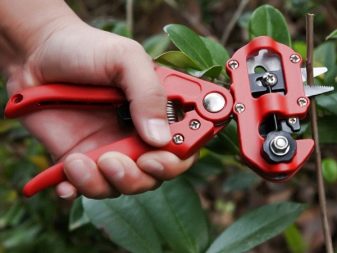
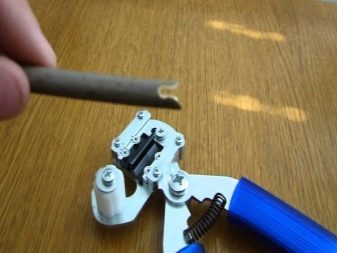
- Knives need to be sharpened periodically, it is best to take out the blades, clamp them in a vice and drive the bar in one direction.
- Do not use pruning shears with old, dry and thick branches - the thickness of the cuttings should not exceed 1 cm.
- It is advisable to disinfect the knife before each vaccination, for which any alcohol-containing agent is suitable.
- The pruner cannot be used for cutting cuttings, since in this case significant physical efforts have to be applied, which significantly reduces the life of the device.
For an overview of the grafting pruner for fruit trees, see the video below.



































































The comment was sent successfully.